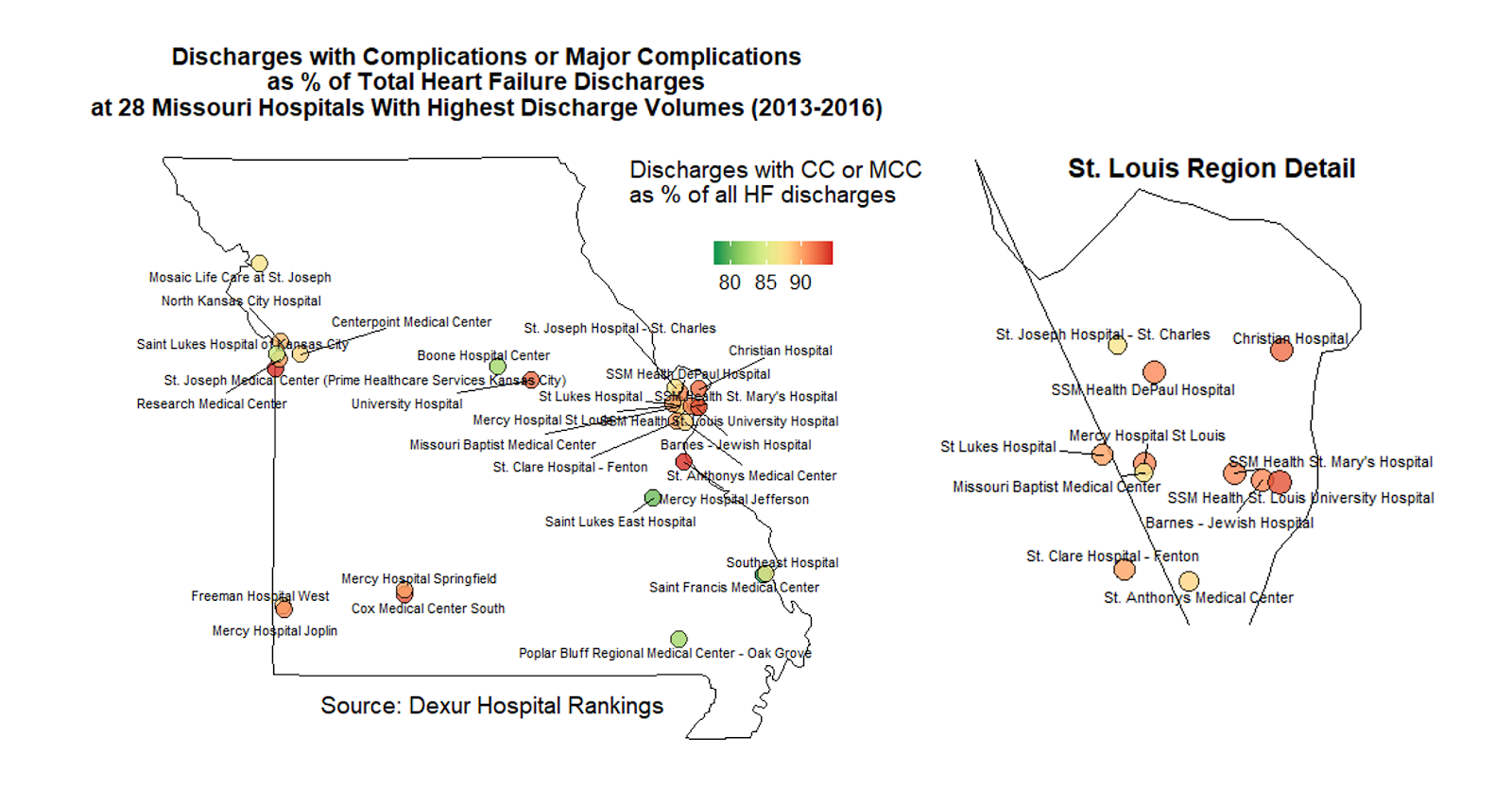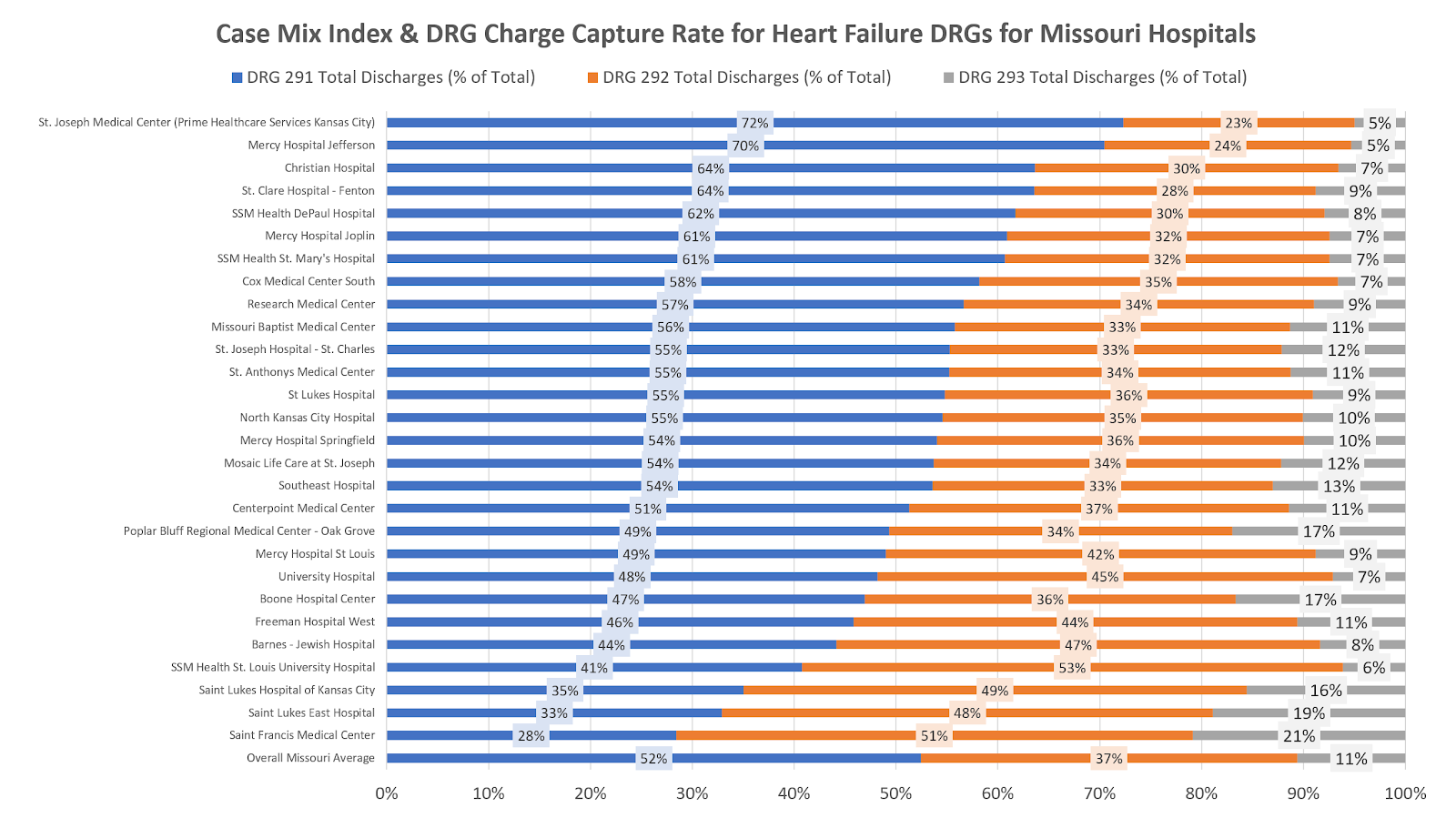Hospitals Near St. Louis Serve Disproportionately More Heart Failure Patients With Complications Than Hospitals Elsewhere in Missouri
In Heart Failure
Get Dexur’s Personalized Hospital Specific Presentation on Quality, Safety, Compliance & Education
By: James Pitt May. 10, 2018
Hospitals serve populations with different risks, even within the same city. The Centers for Medicare and Medicaid Services (CMS) adjusts for risks by categorizing patients into diagnostic-related groups (DRGs). For heart failure (HF) patients, CMS recognizes three DRGs:
- DRG 291 Heart Failure & Shock With Major Complication or Comorbidity
- DRG 292 Heart Failure & Shock With Complication or Comorbidity
- DRG 293 Heart Failure & Shock Without Complication or Comorbidity
A hospital with a high percentage of DRG 293 patients probably serves a healthier population than a hospital with a low percentage of DRG 293 patients. This is called case mix index; it can serve as an indicator of population health but must be used with caution because hospitals may code patients differently. There is evidence that private hospitals report higher case mix index than public hospitals.
Dexur analysts examined the 28 hospitals in Missouri that discharged the most Medicare inpatients with HF from 2013 to 2016. The below chart shows the share of DRGs by severity as a percentage of all heart failure discharges. Saint Francis Medical Center has the highest share of Heart Failure patients without Complication or Comorbidity at 21% of all discharges while Saint Joseph Medical Center and Mercy Hospital Jefferson had the smallest shares at 5%. Missouri's overall average share of uncomplicated heart failure cases for these 28 hospitals is at 14%.

Hospitals that served the most patients with complications tended to be near Missouri’s three largest population centers - St. Louis, Kansas City, and Springfield. However, there was substantial variability in Kansas City and St. Louis. This could indicate that hospitals in these cities serve subpopulations with different complication risks - or that hospitals in these cities code similar patients differently.

The lowest proportions of patients with complications were at Boone Hospital Center (Columbia), Saint Luke’s East Hospital (Lees Summit), Saint Francis Medical Center (Cape Girardeau), and Poplar Bluff Regional Medical Center - Oak Grove (Poplar Bluff).
Certain hospitals discharged a disproportionately high percentage of patients with major complications (DRG 291); others discharged a disproportionately low percentage of patients with major complications. Most of the hospitals that serve disproportionately many HF patients with major complications were in the densely populated counties around St. Louis. Mercy Hospital St Louis, Barnes - Jewish Hospital (St. Louis), SSM Health St. Louis University Hospital (Saint Louis), Freeman Hospital West (Joplin), and University Hospital (Columbia) stood out.
Hospitals that serve disproportionately few HF patients with major complications were more spread out. St. Joseph Hospital (St. Charles) Missouri Baptist Medical Center (St. Louis) were also near St. Louis, while Southeast Hospital (Cape Girardeau), Poplar Bluff Regional Medical Center - Oak Grove (Poplar Bluff), and Boone Hospital Center (Columbia) were deeper in the state.
DEXUR PRO MEMBERS GET ACCESS TO:
- Total HF discharge volumes, discharge volumes for DRG 291, 292, and 293, and DRG percentages of total HF discharges volumes for Barnes - Jewish Hospital, Saint Lukes Hospital of Kansas City, Saint Francis Medical Center, Freeman Hospital West, St Lukes Hospital, St. Joseph Hospital - St. Charles, Cox Medical Center South, Southeast Hospital, Missouri Baptist Medical Center, SSM Health DePaul Hospital, Research Medical Center, Mercy Hospital St Louis, Christian Hospital, Mercy Hospital Springfield, SSM Health St. Louis University Hospital, SSM Health St. Mary's Hospital, Mercy Hospital Joplin, Poplar Bluff Regional Medical Center - Oak Grove, Centerpoint Medical Center, Saint Lukes East Hospital, North Kansas City Hospital, Boone Hospital Center, St. Clare Hospital - Fenton, Mercy Hospital Jefferson, Mosaic Life Care at St. Joseph, St. Anthonys Medical Center, University Hospital, and St. Joseph Medical Center (Prime Healthcare Services Kansas City).
ABOUT THE AUTHOR
